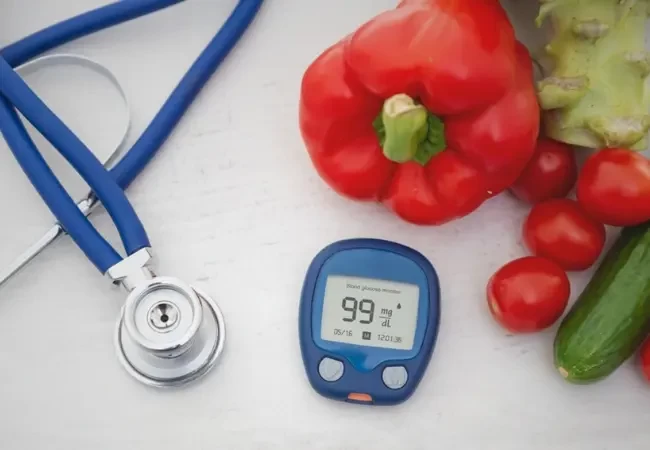Blog
Understanding
Cardiovascular
Diseases

Understanding Heart Disease: Strategies for a Healthier Life
Cholesterol is a natural, waxy substance that circulates in our bloodstream. It plays a crucial role in the construction of healthy cells throughout your body. However, when cholesterol levels become elevated, it can pose a significant risk to your cardiovascular health, potentially leading to heart disease.
Elevated cholesterol levels can contribute to the development of fatty deposits within your blood vessels. Over time, these deposits can progressively grow, narrowing the arteries and impeding the smooth flow of blood. In some cases, these deposits can rupture suddenly, forming blood clots that can trigger a heart attack or stroke. In this blog, we will try to understand cholesterol in a better way.
Can Cholesterol Be Managed Without Medication?
When it comes to cholesterol, it's important to understand the distinction between good cholesterol (HDL) and bad cholesterol (LDL). Elevated LDL cholesterol levels are undesirable and require attention, particularly in individuals with diabetes. While dietary modifications can be beneficial, recent studies have revealed that only 20% of cholesterol comes from food, while the remaining 80% is produced naturally by the body.
Controlling the 80% of the cholesterol that is internally produced is beyond our direct influence, necessitating the use of medication when necessary. However, we can still make a positive impact on the 20% of cholesterol derived from our diet. By adopting healthy eating habits and engaging in regular exercise, we can manage our cholesterol levels to some extent.
Opting for healthier cooking techniques such as baking, grilling, or air-frying can help control cholesterol levels. Regular physical activity also contributes to managing cholesterol, although it has its limitations. But remember, we need to take medicine when we have to.
Know This Before Taking Anti-Platelet for Heart Diseases
Anti-platelet medication, commonly known as blood thinners, raises questions and concerns among individuals. These medications are typically prescribed to patients who have experienced a heart attack. If a person without any other complications has had a heart attack, doctors usually recommend blood thinners for a duration of one year. This is because individuals who have already had a heart attack are at a higher risk of experiencing another one, and blood thinners are administered to prevent this.
It is worth noting that blood thinners may also be prescribed to individuals who are at risk of developing heart disease, as studies have shown their potential in reducing the likelihood of such conditions. However, it is crucial to only use blood thinners under the guidance and prescription of a doctor.
Blood thinners, as the name suggests, help prevent blood clotting, but they can also increase the risk of bleeding. It's important to understand that the effects of blood thinners vary among individuals. Therefore, it is the doctor's responsibility to carefully consider both the benefits and potential drawbacks and find the right balance when prescribing these medications. Only use blood thinners as directed by your doctor, and if instructed to do so, discontinue their use.
Balanced Salt Consumption for Blood Pressure Control
Salt intake is closely linked to high blood pressure, but it does not mean that we should completely eliminate salt from our diets. It is important to find a balanced approach, considering that different individuals have varying needs. Some people may choose to eliminate salt entirely upon discovering their high blood pressure, which can actually lead to adverse health effects due to a decrease in sodium levels.
A balanced solution is necessary, and for adults, the recommended daily salt intake is approximately one teaspoon. While online sources may provide different values such as 5 grams or 2.5 grams, it can be challenging to translate these into practical terms for our daily lives. Often, we tend to add excessive amounts of salt to our meals without realizing it.
To put things into perspective, for a family of four, the maximum amount of salt that can be consumed in a day is four teaspoons. Whether it is the wife, husband, or children who prepare meals, it is crucial for everyone to be aware of this guideline. A practical method is to set aside a small container with four teaspoons of salt specifically designated for the family's daily ration. This way, it becomes easier to control salt intake during cooking. Adhering to this approach allows for the consumption of salt without compromising blood pressure control while safeguarding overall health.
By following these guidelines and using practical strategies like allocating a daily salt ration for your family, you can effectively control your blood pressure and protect your overall well-being.
Causes of Heart Disease in Young People
Heart diseases were once predominantly associated with individuals over the age of 50. However, there is an increasing prevalence of heart issues and angioplasty procedures among individuals as young as 25 or 30. It is essential to recognize that heart diseases do not discriminate based on age. Changing lifestyle patterns play a significant role in this trend.
The COVID-19 pandemic has led to a significant shift in work arrangements, with a large percentage of people now working from home. While remote work offers certain advantages, it also has negative consequences. One such drawback is the reduction in daily physical activity. Without the need to commute or move around an office, exercise routines have been disrupted.
Moreover, habits like snacking during intervals at movie theatres have translated into frequent snacking while working from home, leading to increased calorie intake. This combination of reduced physical activity and higher calorie consumption has a detrimental effect on heart health.
An additional concern that looms is childhood obesity, which will likely become a major health issue. Obesity in children sets the foundation for future heart diseases. Therefore, it is crucial to establish a healthy lifestyle as early as possible.
Conclusion
Understanding heart disease and adopting strategies for a healthier life is crucial for individuals of all ages. Elevated cholesterol levels, if left unmanaged, can lead to the development of fatty deposits in blood vessels, increasing the risk of heart disease. While medication may be necessary to control internally produced cholesterol, lifestyle modifications such as healthy eating habits and regular exercise can positively impact cholesterol derived from the diet. By prioritizing these strategies and making conscious choices, individuals can take control of their cardiovascular well-being and promote a healthier life overall.

More Blogs
-

Struggling with Erection or Early Ejaculation? Here's How to Get Help
Struggling with erectile dysfunction or premature ejaculation? Learn common causes, treatments, and how to seek professional help with confidence.
-

When Should Diabetics Eat? Expert Tips on Meal Timing and Blood Sugar Control
Learn how diabetics can optimize meal timing to better control blood sugar. Expert tips for healthier, more balanced living.
-

Facing the Fear: Understanding Psychological Erectile Dysfunction Before Marriage
Discover the causes and solutions for psychological erectile dysfunction before marriage. Gain insight, support, and confidence for a healthy relationship.
-

Why Overweight Individuals Should Embrace Early Dinners
Ready to lose weight smarter? See why early dinners are a game-changer for overweight individuals aiming for lasting health and weight control.
-

Overweight? Start with This One Powerful Lifestyle Change
Struggling with weight? Most of us eat our heaviest meal of the day at night, usually after 9 or even 10 PM.


 Home
Home  Booking
Booking
 Chat Now
Chat Now  Call Us
Call Us